NCPMI Statement on Equity and Inclusion
The National Center for Pyramid Model Innovations (NCPMI) promotes policies and practices that advance equity, diversity, and the full inclusion and participation of all young children and their families in early care and education environments. The Pyramid Model practices and implementation approach affirm and celebrate the unique identities of young children and their families across all social identities. In accordance with this affirmation:
- NCPMI is dedicated to developing and disseminating products and materials that affirm the highest levels of dignity, respect, and individuality of each child, family, colleague, and community.
- NCPMI is committed to implementing the Pyramid Model to promote more equitable and just early care and education environments for young children, especially for those children who are historically marginalized. NCPMI will promote equitable outcomes for young children by: (a) confronting and dispelling implicit and explicit biases; (b) improving advocacy for young children and families who are often subject to biases; and (c) informing changes in policies, practices, and systems through advocacy.
NCPMI promotes the development of authentic relationships with young children, families and communities to enhance the capacity of early care and learning environments and systems to:
- promote the social, emotional, and behavioral outcomes of all young children,
- eliminate the use of biased and inappropriate discipline practices including suspension and expulsion,
- promote family engagement,
- use data for decision-making,
- integrate early childhood and infant mental health consultation, and
- foster full inclusion, access, and participation of all children.
The Problem
Data from the U.S. Department of Education Office of Civil Rights show that suspension and expulsion continue to be used extensively in early childhood settings (United States Department of Education, 2016) and identify gender and racial disparities in their implementation. Research suggests these practices are associated with negative outcomes that include greater academic failure and grade retention, negative attitudes toward school and higher rates of dropout, and increased rates of incarceration.
Early Childhood Suspensions & Disproportionality: An Issue that Impacts Everyone
The above issues were summarized by Dr. Rosemarie Allen in the following recorded presentation at the 2017 OSEP Leadership Conference.
School Suspension are an Adult Behavior
You can explore this topic some more by viewing this TED talk by Rosemarie Allen
The Response
The US Departments of Education and Health and Human Services (2014) provide recommendations on the prevention and elimination of expulsion and suspension practices especially as they reflect disproportionate rates among children of color. These recommendations suggest that:
- Programs and schools use of evidence-based practices such as the Pyramid Model to promote social/emotional competence in young children
- Staff engage in self-reflective practice that can prevent and eliminate potential biases, and
- Programs and schools provide behavioral supports to children with disabilities, including preschool children with disabilities
The Pyramid Model and Equity
The evidence-based practices identified in the Pyramid Model include an understanding of cultural factors influencing behavior and social/emotional development. As a result, practices include and support cultural awareness and responsiveness. In 2016, the Pyramid Equity Project (PEP) was funded by the Office of Special Education Programs (OSEP) to develop, demonstrate, and disseminate additional culturally responsive tools, materials, and procedures that enhance and supplement those currently available as part of the Pyramid Model.
Featured Resource

Pyramid Model Equity Coaching Guide
The Pyramid Model Equity Coaching Guide provides the classroom coach with a reflection tool to examine the implementation of Pyramid Model practices through the lens of culturally responsive practices and identification of implicit bias. The Pyramid Model Equity Coaching Guide is used within the collaborative coaching partnership and ongoing coaching activities to identify when there are equity concerns related to practice implementation.
Related Resources

Now, more than ever it is important to address issues of race and bias in early childhood settings. Children notice race at a very early age and can begin to categorize people according to skin color. This webinar presents strategies for creating an anti-racist environment to promote the development of healthy racial identities.

This webinar will focus on race and implicit bias in in early childhood programs. Participants will discuss the impact of racial bias on teaching, learning, perceptions of behaviors, and decision making in early childhood environments.

Across the country, families and educators are examining issues of racism and equity. This guide provides information about how young children perceive race and suggestions for how to talk about race with young children.
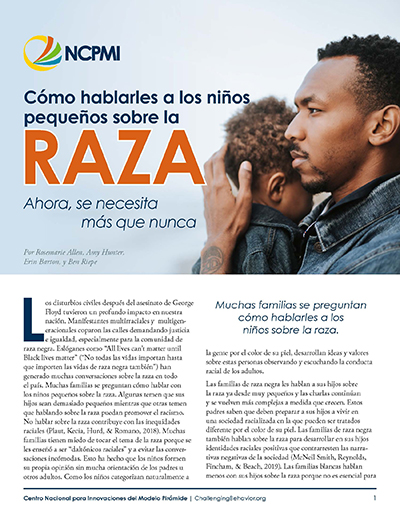
Across the country, families and educators are examining issues of racism and equity. This guide provides information about how young children perceive race and suggestions for how to talk about race with young children.

In this two-part conversation, Dr. Phil Strain and Dr. Rosemarie Allen tackle some challenging topics and have a frank and important discussion about equity, black lives, and racism. They invite you to listen as they discuss the impact of racism on black children and their families, how to talk to children and families about race, what does it mean to be anti-racist early educator, and the importance of the Pyramid Model practices in efforts to be anti-racist.

In this two-part conversation, Dr. Phil Strain and Dr. Rosemarie Allen tackle some challenging topics and have a frank and important discussion about equity, black lives, and racism. They invite you to listen as they discuss the impact of racism on black children and their families, how to talk to children and families about race, what does it mean to be anti-racist early educator, and the importance of the Pyramid Model practices in efforts to be anti-racist.
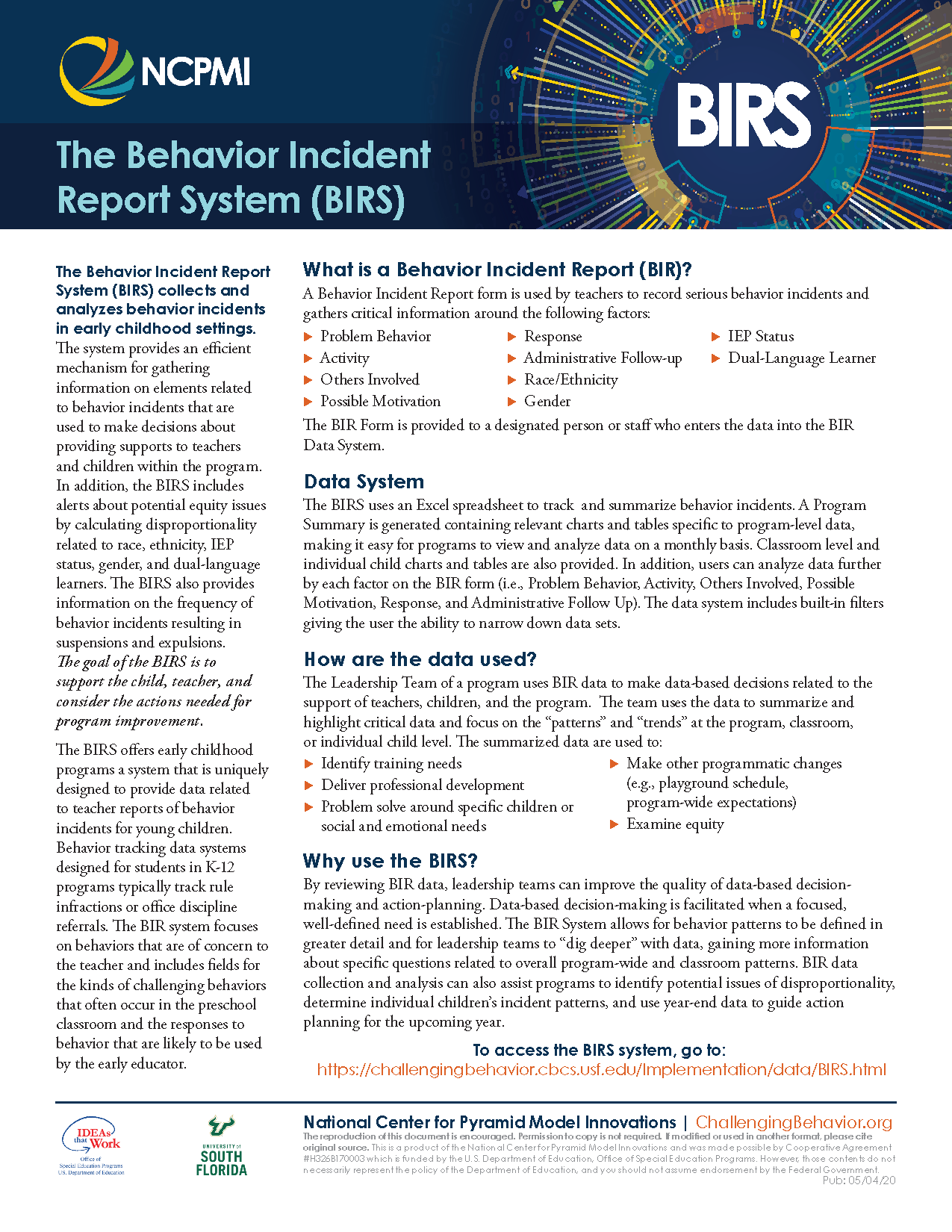
This fact sheet describes the BIR system, features, and value for an early childhood program.
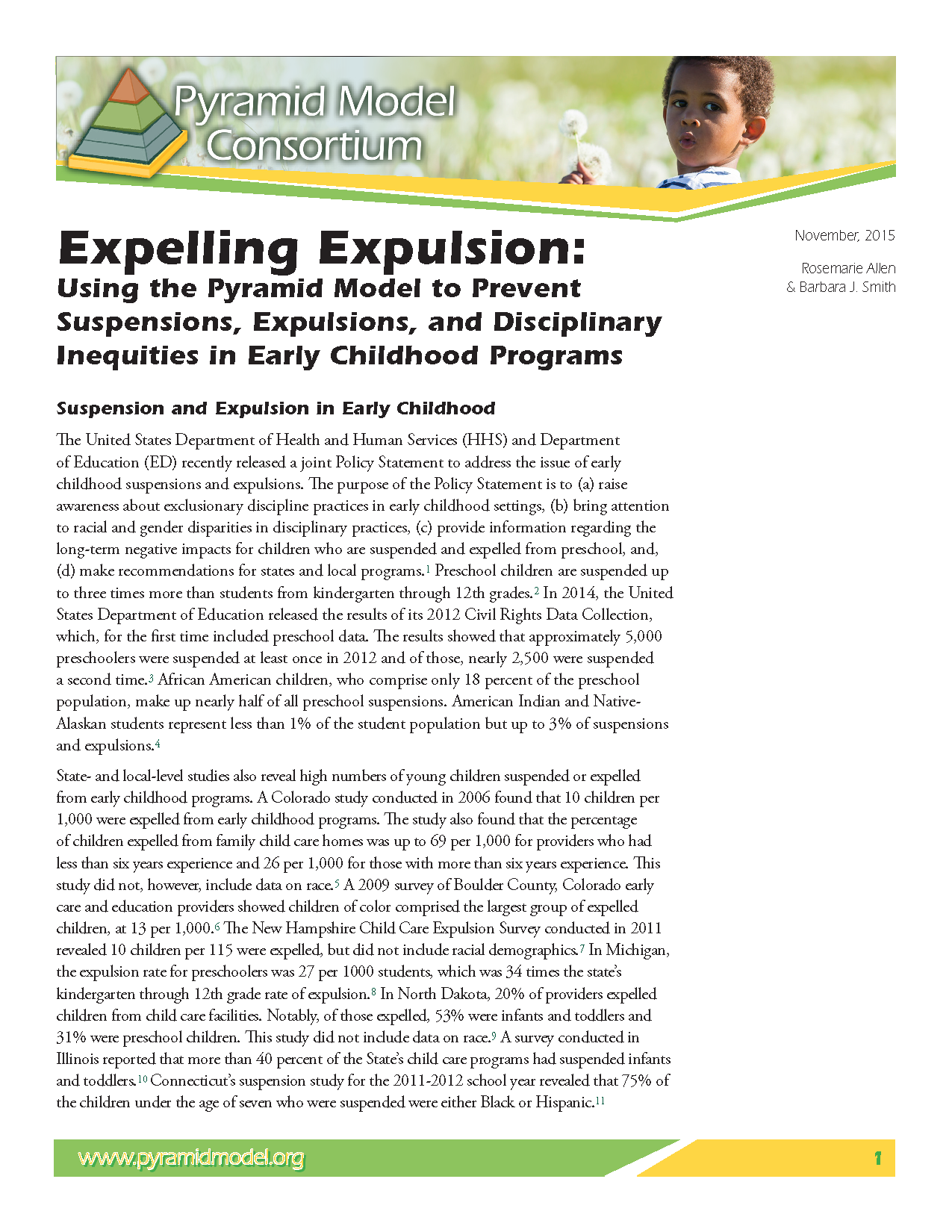
This fact sheet summarizes current research findings about suspension and expulsion of children—particularly children of color—from early childhood settings. Recommendations and suggestions are offered for using the Pyramid Model to address this national problem.
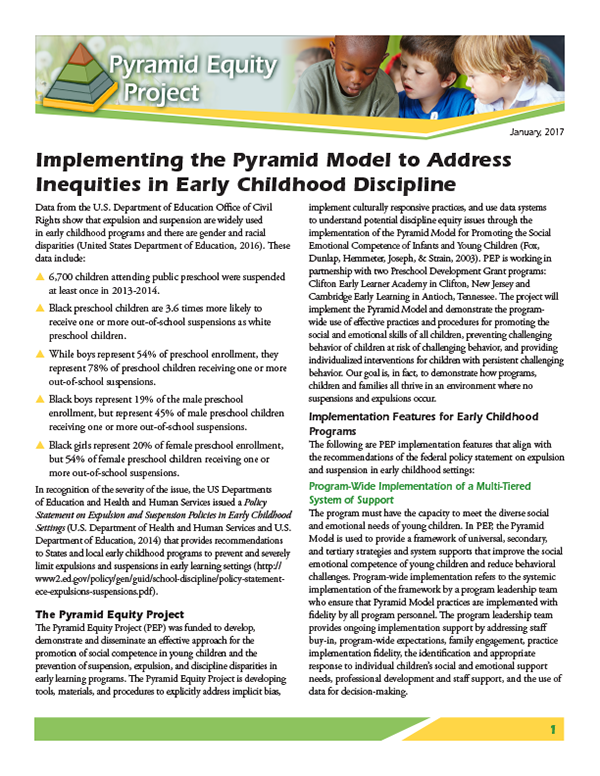
This fact sheet describes how the Pyramid Model is implemented to address equity issues.
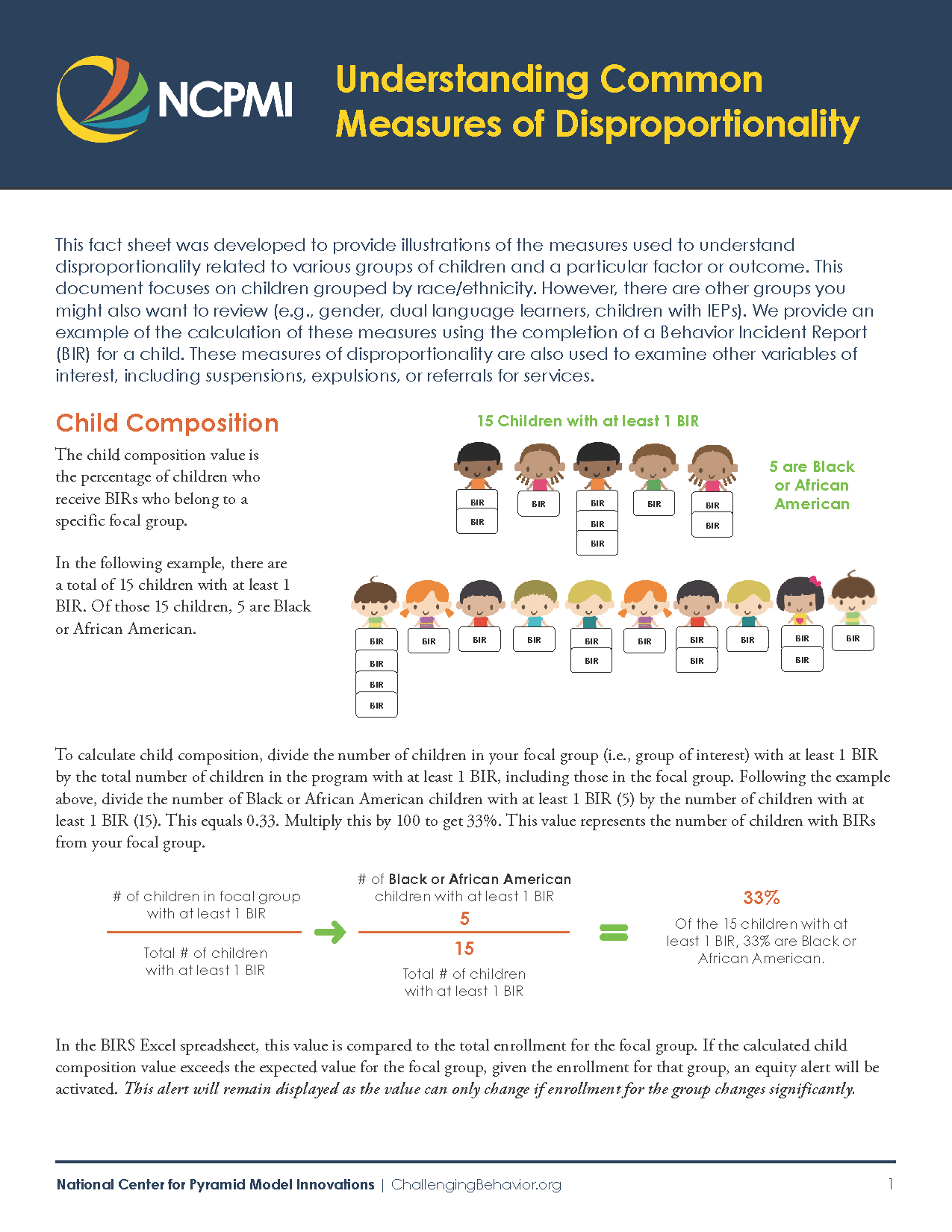
This fact sheet was developed to provide illustrations of the measures used to understand disproportionality related to various groups of children and a particular factor or outcome.
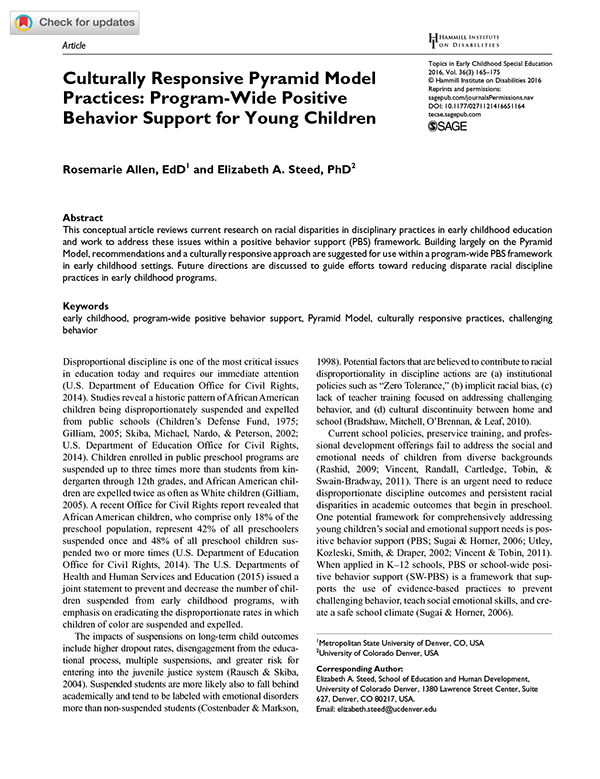
Allen, R., & Steed, E. A. (2016). Culturally responsive Pyramid Model practices: Program-Wide positive behavior support for young children. Topics in Early Childhood Special Education, 36, 165, 175.
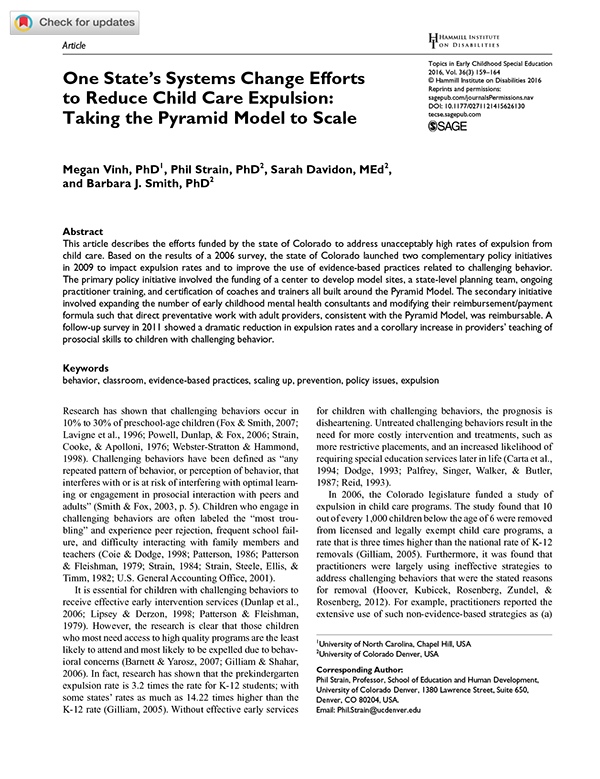
Vinh, M., Strain, P., Davidon, S., & Smith, B.J. (2016). One state’s systems change efforts to reduce child care expulsion: Taking the Pyramid Model to scale. Topics in Early Childhood Special Education, 36, 159-164.
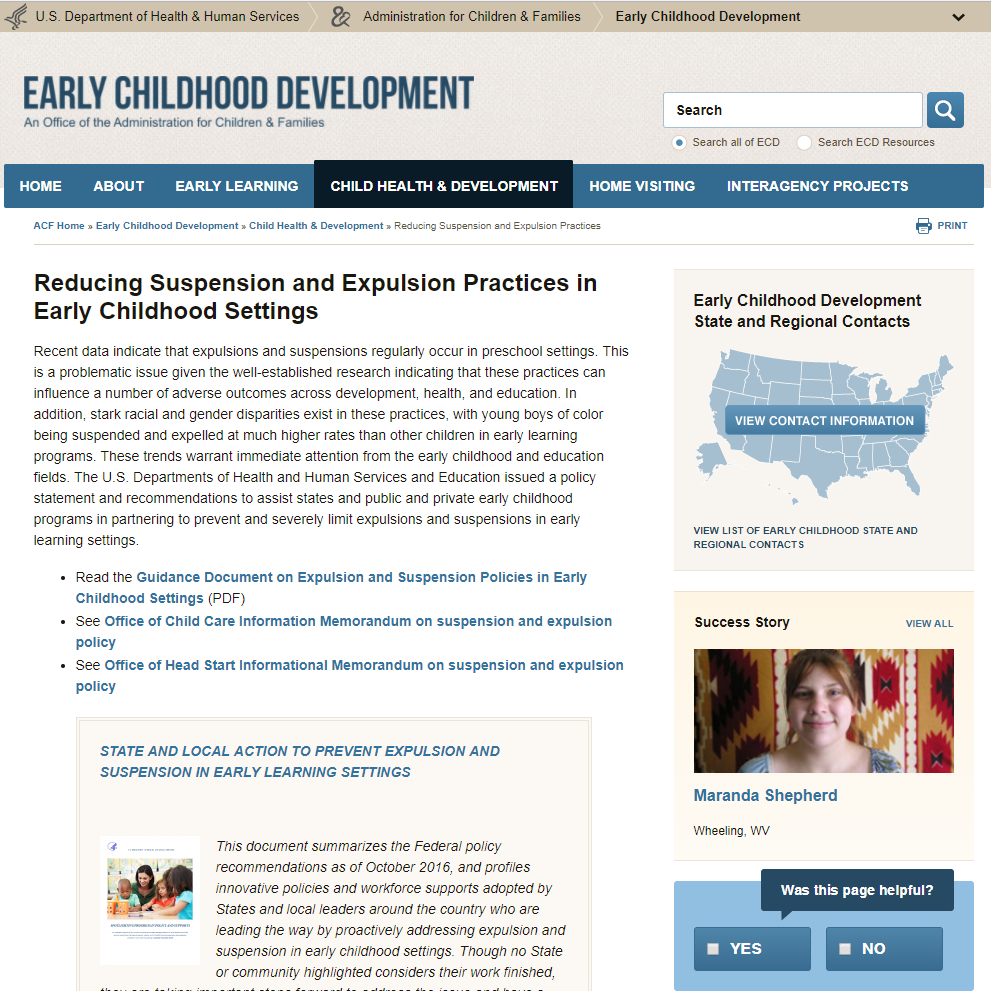
U.S. Department of Health & Human Services, Administration for Children & Families, Early Childhood Development.

Coaches work collaboratively with teachers to support them in implementing Pyramid Model practices. Pyramid Model practices are designed to support young children’s development of social-emotional competence including emotional literacy, problem-solving, communicate their wants and needs, and peer relationship skills and to decrease the likelihood they will engage in challenging behavior. How do coaches support teachers to ensure they are using Pyramid Model practices to address the individual needs of each and every child in their classroom? In this webinar, panelists will discuss ways coaches can support teachers to implement Pyramid Model practices equitably.

Now, more than ever it is important to address issues of race and bias in early childhood settings. Children notice race at a very early age and can begin to categorize people according to skin color. This webinar presents strategies for creating an anti-racist environment to promote the development of healthy racial identities.

When a child is suspended from school, it not only impacts the child, but the entire family. Parents often feel isolated and ashamed. They may also feel defeated with nowhere to turn. Many parents worry about the impact of the suspension on the child’s future, losing their job to care for the child during the suspension period, their child being targeted, and their child’s ability develop and maintain positive relationships with teachers and peers. During this webinar, parents share the impact of their child’s suspension(s) on the family.

Many state leaders use the evidence-based Pyramid Model framework as an approach to build social and emotional competence in early care and education programs. Wisdom gleaned by state leaders to systematically implement, scale up and sustain their Pyramid Model efforts are being highlighted in this webinar series. Each webinar includes lessons learned and resources related to specific aspects of statewide implementation. We welcome champions of this work to join, share, and learn with us.
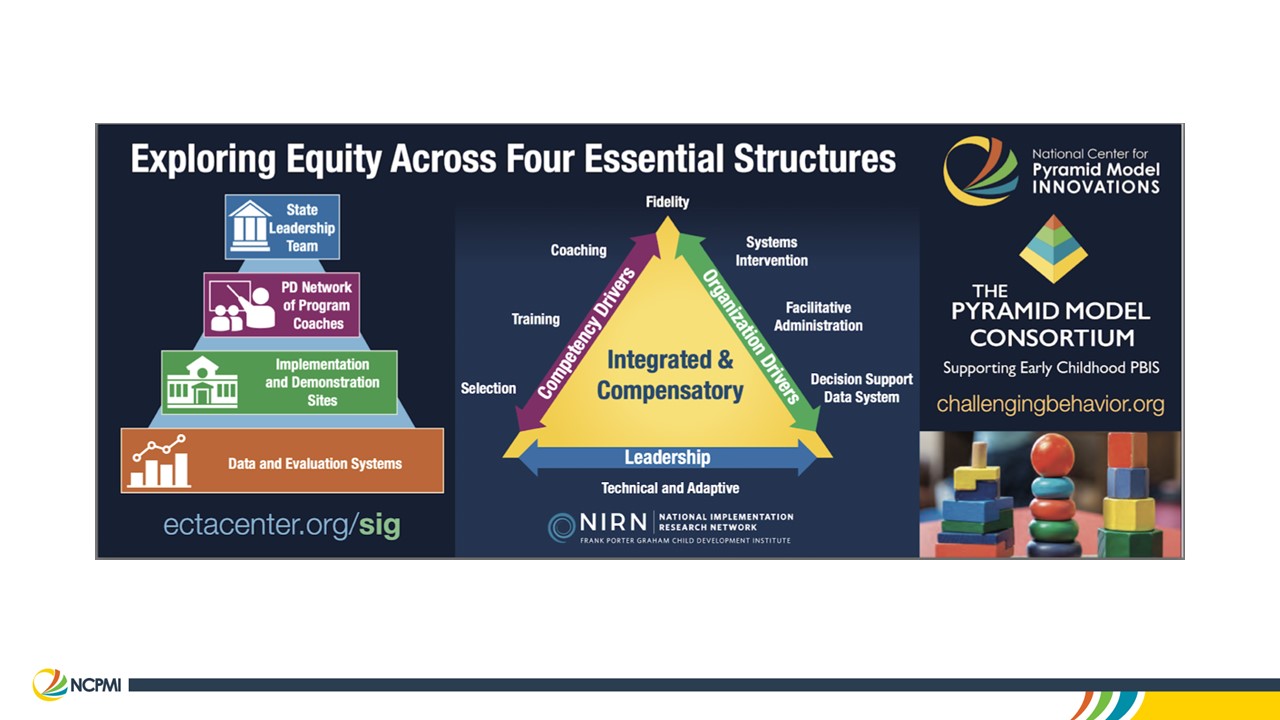
Many state leaders use the evidence-based Pyramid Model framework as an approach to build social and emotional competence in early care and education programs. Wisdom gleaned by state leaders to systematically implement, scale up and sustain their Pyramid Model efforts are being highlighted in this webinar series. Each webinar includes lessons learned and resources related to specific aspects of statewide implementation. We welcome champions of this work to join, share, and learn with us.

This webinar will focus on race and implicit bias in in early childhood programs. Participants will discuss the impact of racial bias on teaching, learning, perceptions of behaviors, and decision making in early childhood environments.
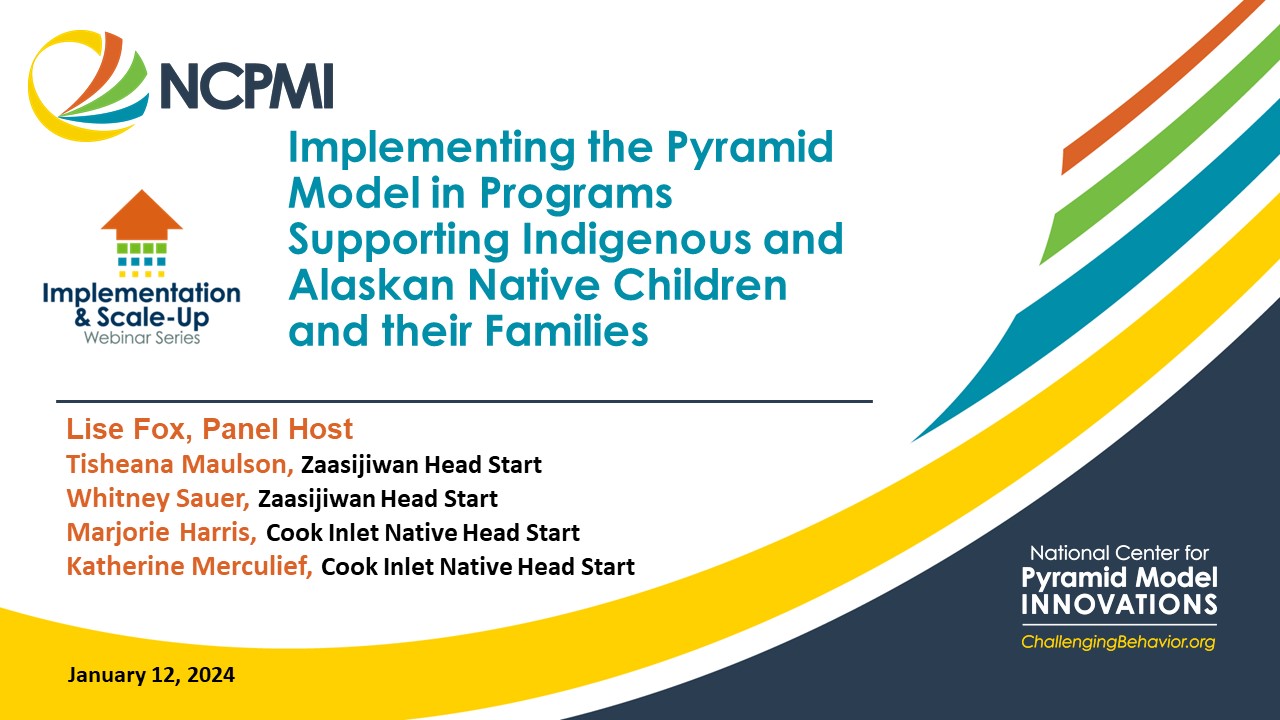
Is the Pyramid Model a framework that can be used in programs serving indigenous children and their families? What changes need to be made to ensure a fit with the culture of tribes and families served by those programs? Join us for a discussion from two programs, Cook Inlet Native Head Start in Alaska and Zaasijiwan Head Start in Wisconsin, to learn more about their Pyramid Model implementation and outcomes.
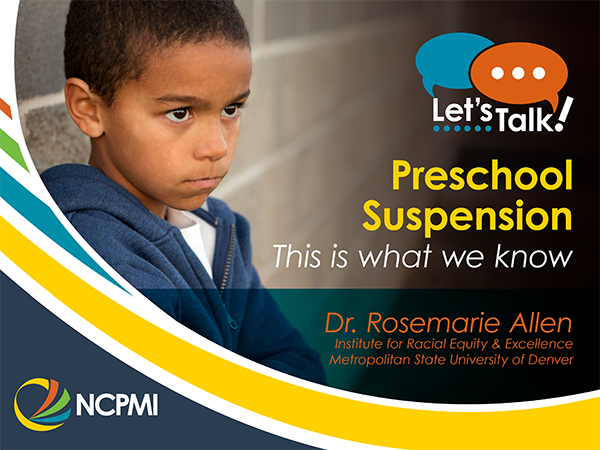
The “Let’s Talk” webinar series, hosted by Dr. Rosemarie Allen, provides panel discussions related to equity, inappropriate discipline practices, and effective strategies. This session will discuss preschool suspensions.
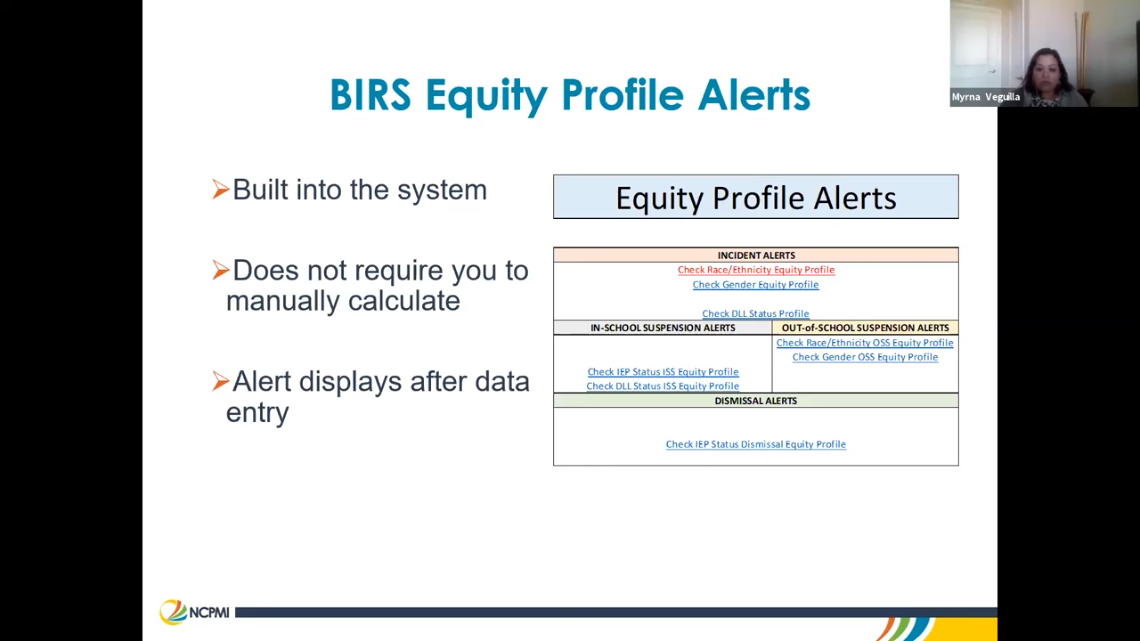
The Behavior Incident Report System (BIRS) Excel spreadsheet has the capacity to alert early childhood programs of possible disproportionality for various groups of children and a particular factor or outcome (i.e., behavior incident frequency, suspension, expulsion). This webinar will discuss the BIRS Excel spreadsheet’s built-in equity alerts, what the measures of disproportionality mean, and how a leadership team will review them. We will also present resources programs can use in their work towards equity.
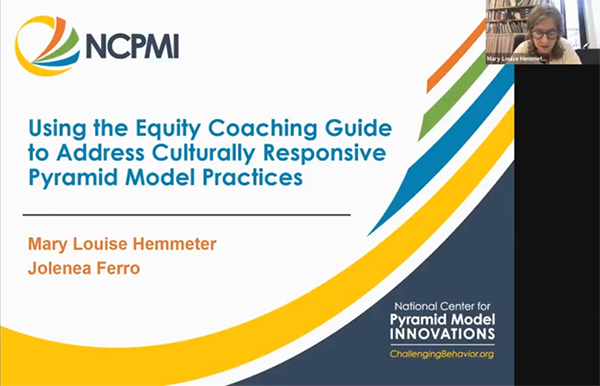
This webinar provides an overview of the Pyramid Model Equity Coaching Guide, and how it can be used as a coaching tool to support culturally responsive practice in the classroom and with families. Presenters define culturally responsive practice, identify equity issues in the context of coaching, and share examples of opportunities of when and how to use the guide to support coaching work. This discussion is followed up with a short Q&A session.

In this two-part conversation, Dr. Phil Strain and Dr. Rosemarie Allen tackle some challenging topics and have a frank and important discussion about equity, black lives, and racism. They invite you to listen as they discuss the impact of racism on black children and their families, how to talk to children and families about race, what does it mean to be anti-racist early educator, and the importance of the Pyramid Model practices in efforts to be anti-racist.

In this two-part conversation, Dr. Phil Strain and Dr. Rosemarie Allen tackle some challenging topics and have a frank and important discussion about equity, black lives, and racism. They invite you to listen as they discuss the impact of racism on black children and their families, how to talk to children and families about race, what does it mean to be anti-racist early educator, and the importance of the Pyramid Model practices in efforts to be anti-racist.

Panelists will share their experiences as a Pyramid Equity Program (PEP) site, discussing what worked, challenges and overall success in implementing the Pyramid Model, with a specific focus on addressing equity. They will share their experiences using equity tools such as the Behavior Incident Reporting System (BIRS) and the Pyramid Model Coaching Equity Guide.

This training provides information on the importance of culturally responsive practices in enhancing outcomes for all children, especially those from diverse backgrounds. In addition, issues concerning implicit bias are discussed. The development of this module was supported by the Pyramid Equity Project in collaboration with the University of South Florida, the University of Colorado Denver, and the PBIS Center with Preschool Development Grant national activity funding.
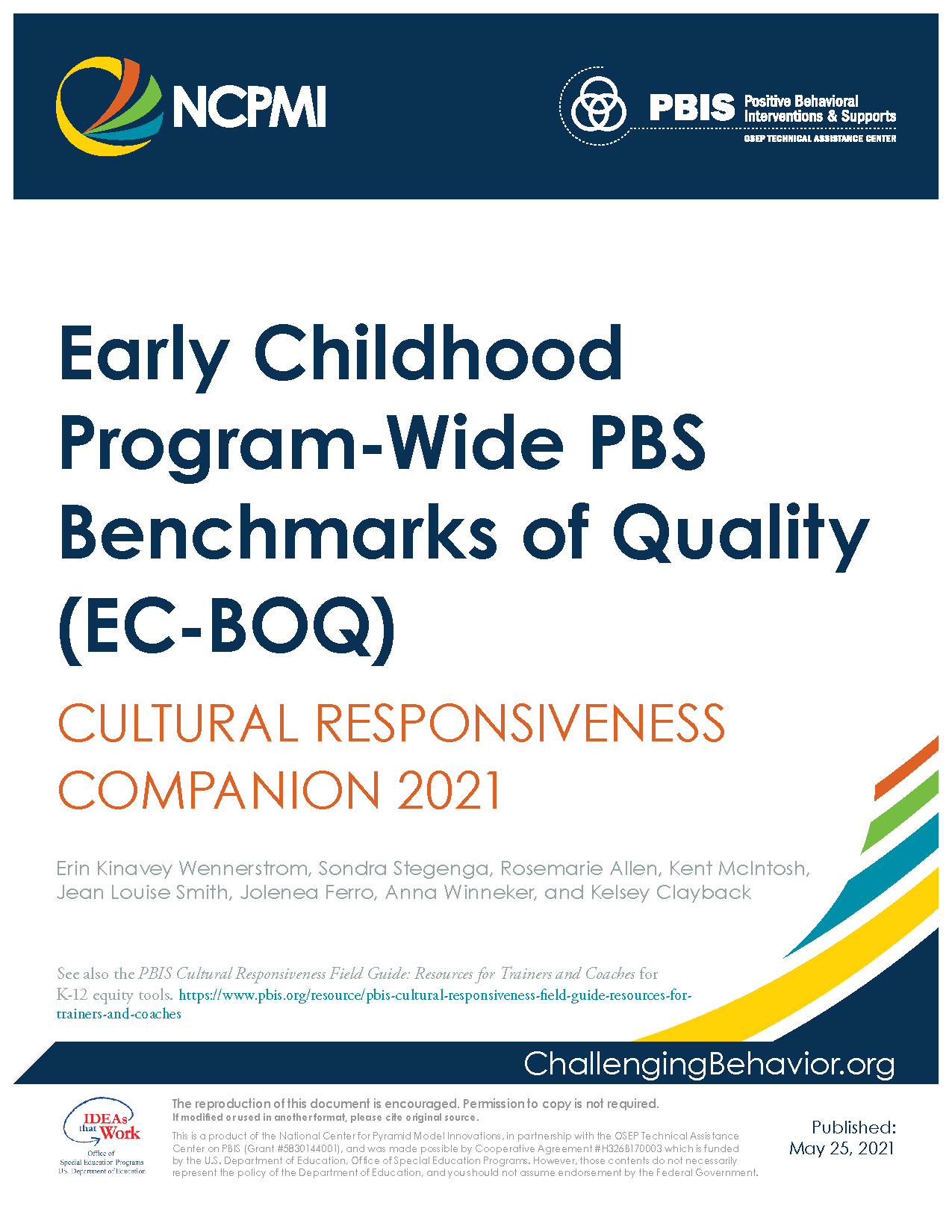
This is a companion to the Early Childhood Program-Wide PBS Benchmarks of Quality. It is a resource for early childhood PBS implementation teams to enhance the fit of their Pyramid Model systems with the cultural needs of children and families.

This brief provides practitioners with practical strategies for building relationships and collaborating with families from racially and ethnically diverse cultural backgrounds. It identifies common challenges and offers strategies for addressing them.
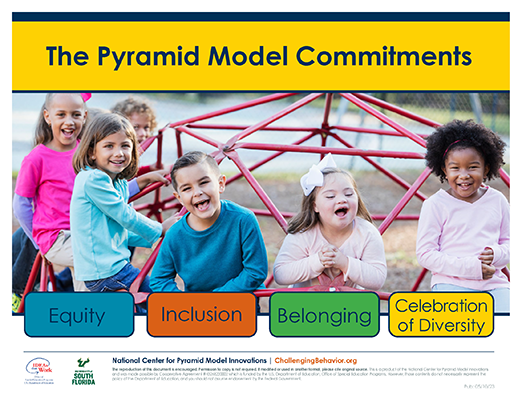
Poster displaying Pyramid Model commitments to equity, inclusion, belonging, and celebration of diversity.

The Pyramid Model Equity Coaching Guide provides the classroom coach with a reflection tool to examine the implementation of Pyramid Model practices through the lens of culturally responsive practices and identification of implicit bias. The Equity Coaching Guide is used within the collaborative coaching partnership and ongoing coaching activities to identify when there are equity concerns related to practice implementation.

This document provides program leadership teams with guidance to support their efforts to eliminate suspension and expulsion and promote equitable, inclusive and culturally responsive practice in all early childhood settings including public and private schools and child care centers.

This document provides state leadership teams with guidance on how to prevent suspension and expulsion by integrating with existing efforts including Pyramid Model, Multi-Tiered System of Supports (MTSS), Quality Rating Improvement System (QRIS), inclusion and State Systemic Improvement Plan (SSIP) efforts. This resource is organized around the Guiding Principles and Recommendations from the federal Joint Policy Statement on Expulsion and Suspension Policies in Early Childhood Settings (HHS/ED, 2014).
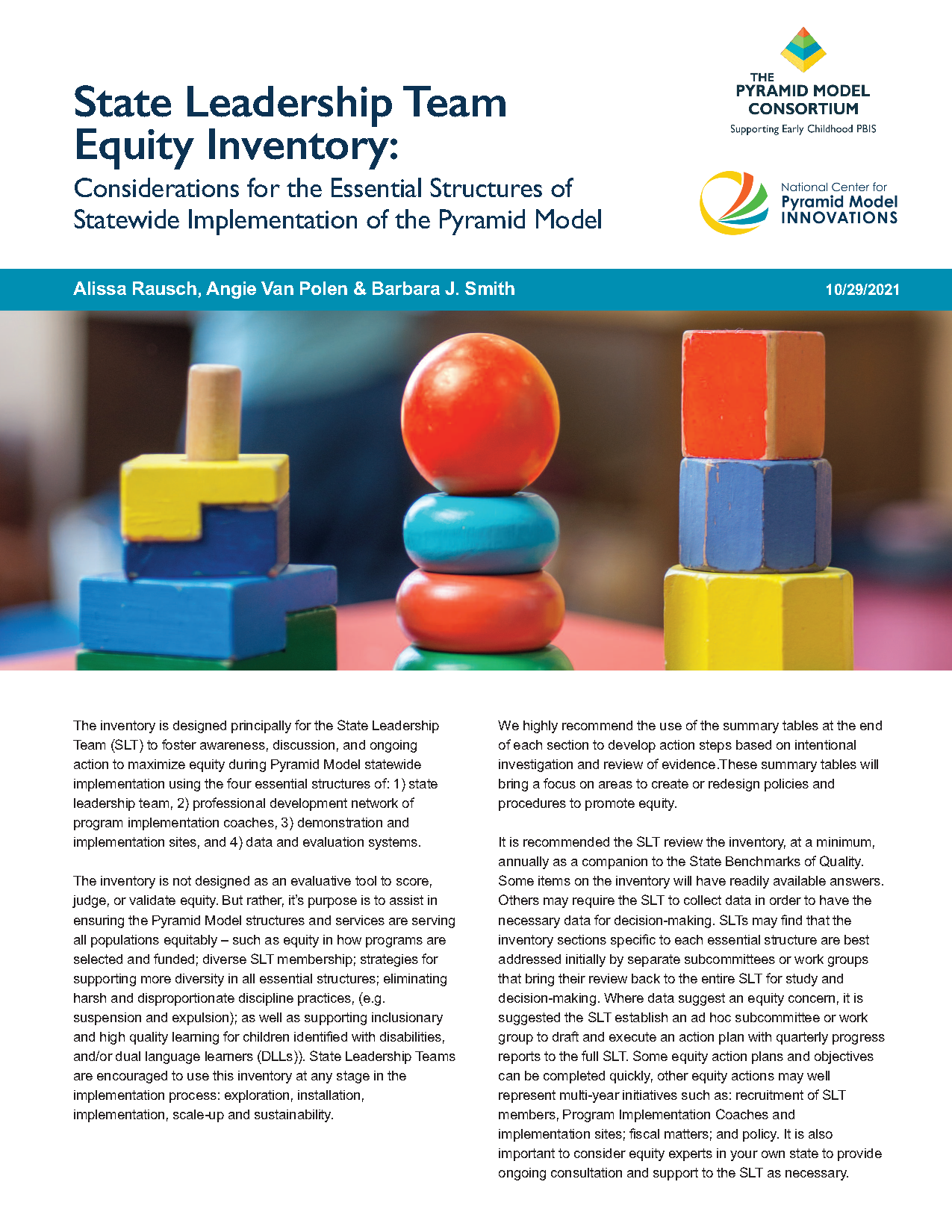
This tools is designed for use by State Leadership Teams to foster awareness, careful discussion and ongoing action planning to maximize equity considerations during Pyramid Model statewide implementation.

This guide provides resources that support early childhood professionals to integrate the Pyramid Model practices and trauma-informed care. The intended audience includes program leaders and administrators, educators, and staff in early intervention and early childhood classrooms. The purpose of this guide is to help early childhood professionals apply the principles of trauma-informed care in various settings to meet the diverse needs of young children and their families who have experienced trauma.
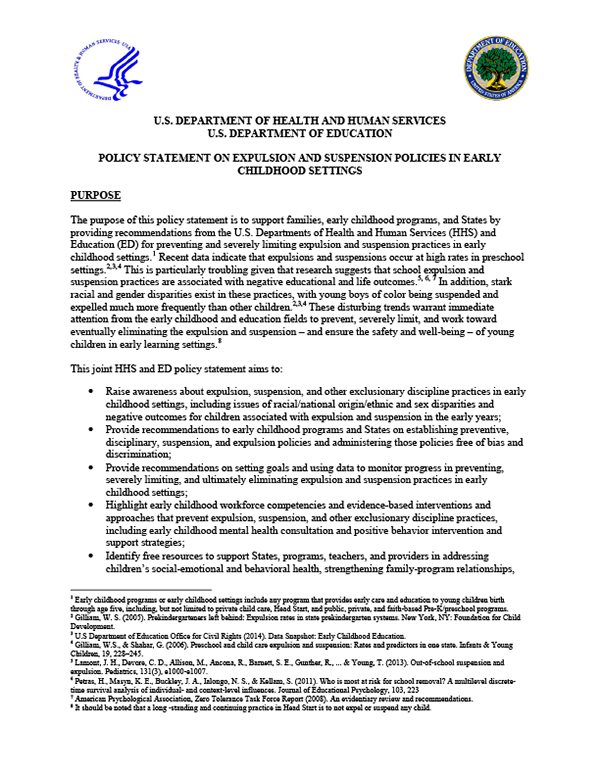
The purpose of this policy statement is to support families, early childhood programs, and States by providing recommendations from the U.S. Departments of Health and Human Services (HHS) and Education (ED) for preventing and severely limiting expulsion and suspension practices in early childhood settings.
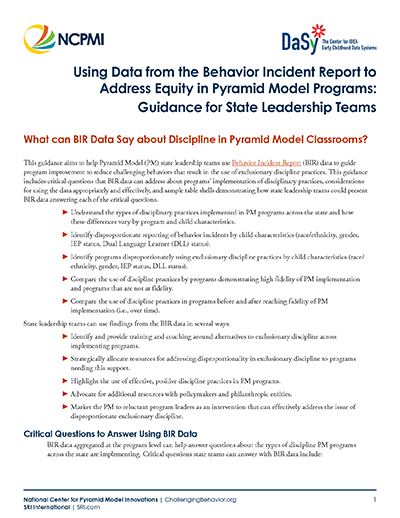
This resource provides State Leadership Teams with guidance on the collection and analysis of behavior incident report data from programs.



